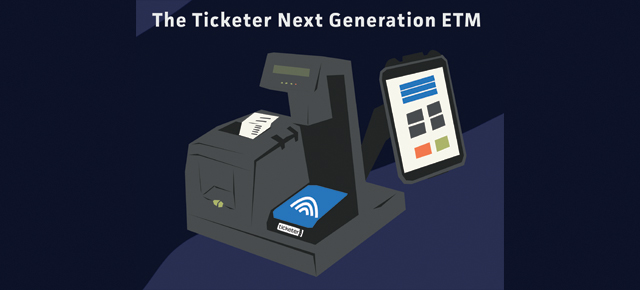Ticketer has built a reputation on placing customers at its heart and that continues with Next Gen ETM and Bee Network rollout
Ticketer is well recognised for offering flexible cloud-based and on-bus solutions that aim to keep things simple for operators. It has been a busy few months for the company with the launch of the next iteration of its Electronic Ticket Machine (ETM) and the continuing rollout of an integrated ticketing and Automatic Vehicle Location (AVL) solution for Greater Manchester’s franchised Bee Network. But that’s not all, Ticketer is also working on a range of other improvements.
Differing customers; same platform
“Working with local authorities and commercial bus operators is our bread and butter,” says Richard Blackburn-Hughes, Ticketer’s chief commercial officer. “Our general desire is to support the bus industry in whichever form it takes, be that partnership or franchise. Our solution is completely adaptable to however the bus industry organises itself.”
With the emergence of bus franchising, Ticketer aims to offer the same great service it has become renowned for to both franchiser authorities and franchisee operators equally.Jason Mann, Ticketer’s director of product, adds: “Franchising is just one of the tools available – what we want to do is make bus travel as easy as possible for the passenger.”
Bringing Bee Network to life
Ticketer played a crucial role in launching Greater Manchester’s Bee Network in September 2023, providing Transport for Greater Manchester (TfGM) with a comprehensive suite of services, including their Next Generation ETMs and Ticketer Smart Gateway. TfGM was able to benefit from an already fully featured ticketing and AVL solution with expanded functionality in areas such as disruption management and service control. The company also integrated with TfGM’s chosen contactless payment solution.
The Ticketer portal was tailored for TfGM and its franchise partners, enabling efficient management of operations, corridor and headway management and robust reporting procedures. Controllers can monitor service delivery, with data seamlessly flowing to TfGM’s passenger travel tools.
Improving retail
“Within the Bee Network, there’s a unified back office,” explains Jason. “This mirrors our approach in commercial markets like Leicester and Cornwall, both of which feature multiple operators with established infrastructure.”
Despite the technical complexity of establishing such a setup, Jason says Ticketer has a proven ability to navigate these challenges, attributing their success to creating solutions that not only support operators, but enhance the passenger experience too.
This collaborative approach extends to the introduction of Tap On / Tap Off technology, led by larger commercial operators but with increasing involvement from local authority led multi-operator ticketing schemes as part of their Bus Service Improvement Plan commitments. These initiatives generate valuable data, providing operators with insights into passenger boarding and alighting patterns for the first time. Jason describes it as “like gold dust”, offering newfound visibility into passenger journeys.
We want to make things as flexible as possible for our customers
“We want to make things as flexible as possible for our customers,” adds Richard. “The same extends to digital retail where we have major integrations with other third-party app providers. That’s now expanded to include APIs for our QR code ticketing, so it’s even easier to integrate with Ticketer.”
Some of those third-party integrations include multi-modal travel, an area that Richard expects will increase in the coming years. By using the QR code API, third-party providers gain full traceability of passenger journeys, enhancing the data set further.
Next generation device
Ticketer first launched its enhanced Next Generation ETM within TfGM’s Bee Network. Richard believes the device’s modernisation capitalises on technological improvements, with improved transaction speeds and responsiveness while laying the groundwork for future upgrades.
The key innovation lies in transitioning to an Android-based tablet for the driver console. “It’s an evolution, not a revolution,” notes Richard, highlighting the interface remains the same but the additional performance provides a firm basis for future improvements.
Jason echoes this sentiment, citing performance enhancements, faster transaction speeds and a more robust interface. “We’ve always believed in using modular ‘plug and play’ components – the shift to an Android tablet screen aligns with that ethos.”
Consequently, Ticketer customers can upgrade specific components, like the screen or card reader, within their current ETM setup instead of replacing the entire machine. This approach enables them to leverage these new enhancements without a complete overhaul.
Ticketer’s commitment to customer satisfaction means continuously enhancing features and functionality. Road Restriction Alerts were introduced in 2021 for Ticketer ETMs to detect height and width limitations such as low bridges. Hearing customer feedback, it was evolved to include navigational and hazardous restrictions to help with diverse weather conditions like icy and flooded roads, plus time-based disruptions such as roadworks.
For more information about Ticketer visit: www.ticketer.com
This story appears inside the latest issue of Passenger Transport.
DON’T MISS OUT – GET YOUR COPY! – click here to subscribe!
The post Customer first ethos continues first appeared on Passenger Transport.

